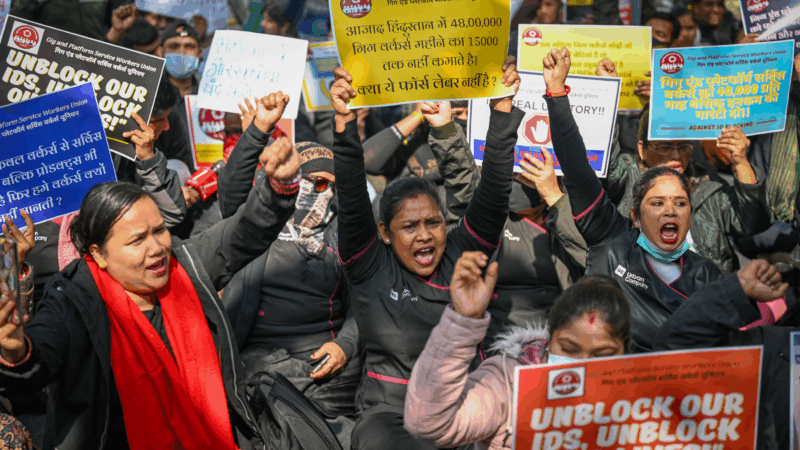Congressional District 3
The 3rd district stretches from Cherokee County, down to Montgomery and eastward to Talladega. It’s a mostly rural district – dotted with small towns, the Talladega Superspeedway, Auburn University and the Anniston Army Depot, where Congressman Mike Rogers recently helped break ground on a 26 million dollar industrial wastewater treatment plant. The plant will nearly double the amount of wastewater processed at the depot and help keep dangerous chemicals out of the water system. Rogers says it’s a critical upgrade.
(Rogers) “It didn’t happen by accident either. I pestered the White House for months to make sure it was in the budget. But the White House has been very receptive about making sure that our war fighter has what they need. So it took a while but it wasn’t a real difficult sell once we convinced them it was essential.”
Lately, Rogers has been working hard to convince voters he’s getting things done for them in Washington. Just a few months ago the 3-term incumbent had a sizable lead in the polls against democratic challenger Joshua Segall. But, as the margin has narrowed, the negative campaigning has increased.
Watch a television ad from Mike Rogers
Watch a television ad from Joshua Segall
Not surprisingly, both sides say the ads are misleading. Rogers paints Segall as an outsider. In fact, Segall was born and raised in Montgomery. His family has lived there nearly a century.
(Segall)”Used to have a furniture store in Montgomery. If you ever bought a turquoise lamp you probably bought it in my grandparents store in the late 70s.”
The TV ads call Segall an ultra-liberal, ready to line up behind with Nancy Pelosi. Segall says he’s ready to break ranks on certain issues.
(Segall)”Certainly on taxes. I think we don’t need to increase taxes right now and there’s been some talk that the Democratic Party might be willing to do that.”
Segall’s also against government-backed universal health care and gun control and in favor of prayer in school and off-shore drilling.
For his part, Congressman Rogers disputes charges that he’s anti-farmer because he voted against a recent farm bill. He supports the farm subsidy program and says he voted against the popular farm bill because it included tax increases.
Rogers says ads attacking his vote on the federal bailout plan – he voted for it – are also unfair.
(Rogers)”The easy vote was to vote no and to just come back home and say, well you know I did was 95% of the people felt like on their initial information about their circumstances. But the fact is, all the members of Congress had detailed briefings about it, how bad the economic situation was. This was truly a global crisis that required immediate action. The tough vote was to do what we felt like would best protect our people back home.”
(Segall) “I would have had a plan that was geared toward helping regular people in Alabama who got hurt by the stockmarket. But right now, nobody knows what the rules are of this Wall Street bailout. Nobody knows who’s going to be bailed out. What standards are being applied to determine who gets bailed out. Nobody knows how we’re going to keep politics out of it.”
(Rogers) “Once we get credit flowing and people know that it’s safe to borrow money from other banking institutions, I think you’re going to see us really start moving the economy.”
(Segall) “We have a lot of people who are retiring and they can’t afford to wait for the stock market to go back up. We’ve got a lot of people who are going to go to college now and they can’t afford to wait for the stock market to go back up for their college saving.”
People are hurting. That’s one thing Rogers and Segall agree on, as they continue what has become an expensive campaign for Congressional District 3. Rogers’ campaign says it has almost 750-thousand dollars cash on hand. And national Democratic Party leadership has placed the district on its “red-to-blue” list, meaning it thinks Segall has a chance of unseating Rogers. What this means for voters is that they’ll likely see the campaign ads and public appearances ramp up in these last few days before the election.

Birmingham Southern College political scientist Natalie Davis talked with WBHM’s Tanya Ott about the District 3 race.
Where the candidates stand on the issues:
MIKE ROGERS
Economy: voted for the $700 billion federal bailout plan
Iraq: supports the war in Iraq
Immigration: advocates more border patrol agents and better technology to catch illegal immigrants
Energy: supports off-shore drilling and investing in renewable alternatives
Gun Policy: against gun control
JOSHUA SEGALL
Economy: against the federal bailout plan
Iraq: supports pulling out of Iraq
Immigration: against amnesty for illegal immigrants
Energy: supports off-shore drilling and investing in renewable alternatives
Gun Policy: against gun control
Camp Mystic parents from Alabama seek stronger camp regulations
Sarah Marsh of Birmingham, Ala. was one of 27 Camp Mystic campers and counselors swept to their deaths when floodwaters engulfed cabins at the Texas camp on July 4, 2025. Sarah’s parents are urging lawmakers in Alabama and elsewhere to tighten regulations.
Court rebuffs plea from domestic workers for better pay and respect
They're often paid low wages and lack job protections. A petition to the country's supreme court to support their demands did not see success — and they are protesting.
Spy agency says Kim Jong Un’s daughter is close to be North Korea’s future leader
Seoul's assessment comes as North Korea is preparing to hold its biggest political conference later this month, where Kim is expected to outline his major policy goals for the next five years.
Using GLP-1s to maintain a normal weight? There are benefits and risks
Drugs like Zepbound and Wegovy are intended for people who are overweight. Some patients are using them after bariatric surgery to keep pounds from creeping back. Others may just want to lose a few pounds.
Jordan Stolz opens his bid for 4 golds by winning the 1,000 meters in speedskating
Stolz received his gold for winning the men's 1,000 meters at the Milan Cortina Games in an Olympic-record time thanks to a blistering closing stretch. Now Stolz will hope to add to his collection of trophies.
How the FBI might have gotten inaccessible camera footage from Nancy Guthrie’s house
Last week, law enforcement said video footage from Nancy Guthrie's doorbell camera was overwritten. But the FBI has since released footage as Guthrie still has not been found.







